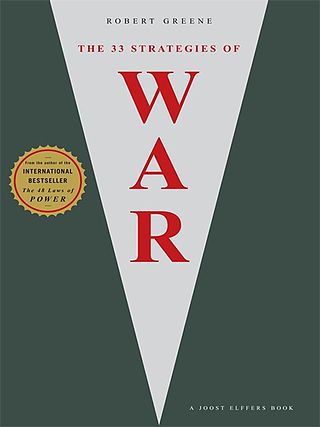The 33 Strategies of War
2006 book by Robert Greene From Wikipedia, the free encyclopedia
The 33 Strategies of War is a personal development and self-help book. It was written by American author Robert Greene in 2006. It is composed of discussions and examples of offensive and defensive strategies from a wide variety of people and conditions, applying them to social conflicts such as family quarrels and business negotiations.[1][2]
 | |
| Author | Robert Greene |
|---|---|
| Language | English |
| Genre | Business, management, military history, psychology, self-improvement |
| Publisher | Penguin Group (HC); HighBridge Audio (CD) |
Publication date | January and April 2006 |
| Publication place | United States |
| Media type | Print (hardcover) and CD |
| Pages | 496 |
| ISBN | 0-670-03457-6 (HC); 978-1-59887-091-6 (CD) |
| Preceded by | The Art of Seduction |
| Followed by | The 50th Law |
Reception
The Independent said Greene has set himself up as "a modern-day Machiavelli" but that "it is never clear whether he really believes what he writes or whether it is just his shtick, an instrument of his will to shift £20 hardbacks" and concludes "There is something less than adult about it all."[3] Admiral James G. Stavridis said the book had good breadth, but it lacked depth.[4] Leadership theorist and author John Adair said Greene "shows a poor grasp of the subject" and the book is based on the flawed "assumption that the art of military strategy and the art of living are comparable".[5] Booklist said the book was repetitive, lacked a sense of humor, and had an annoying "quasi-spiritual tone".[6] NBA player Chris Bosh stated that his favorite book is The 33 Strategies of War.[7][8][9] The book has been banned by several US prisons.[10]
The book was described by one reviewer as having "far too many duff sentences",[3] such: "Your goal is to blend philosophy and war, wisdom and battle, into an unbeatable blend."[3][11] It has sold more than 200,000 copies.[12]
See also
References
External links
Wikiwand - on
Seamless Wikipedia browsing. On steroids.
